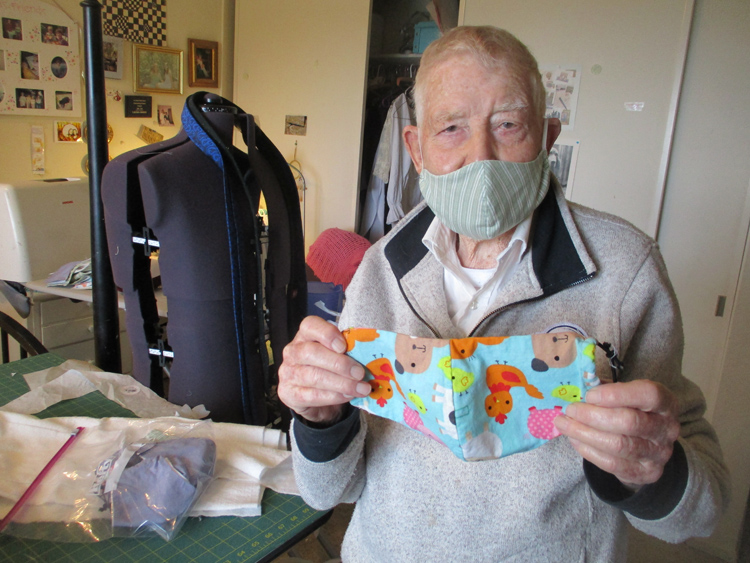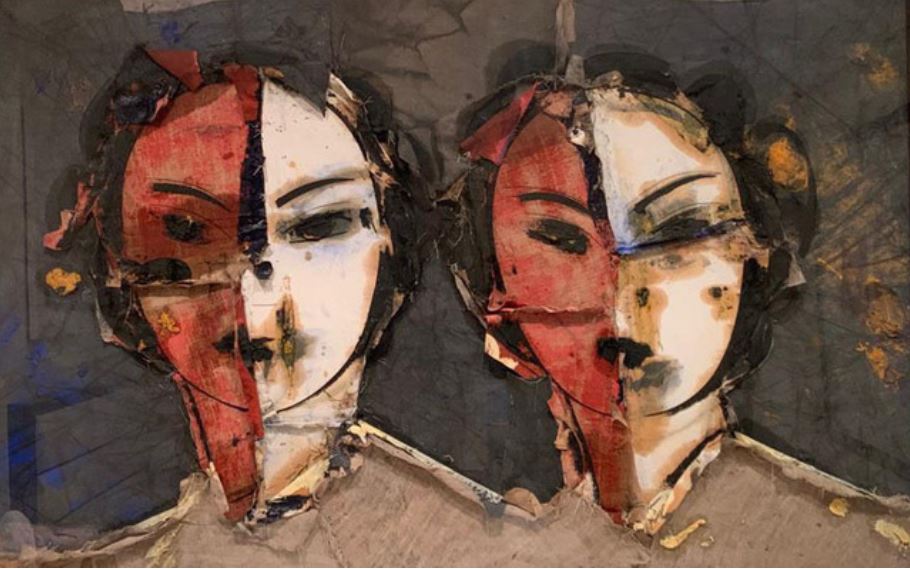91 and Not Dead Yet:
We’re All Manichæists Now
by Reg Green (August 2020)
Doble imagen sobre fondo gris, Manolo Valdés, 2008
There are two kinds of people in the world: those who divide the world into two kinds of people and the rest. So said Robert Benchley, whose urbane 1940s New Yorker approach to life, sad to say, is not held in much regard by today’s more literal-minded readers.
But if there was ever a time in history when it was true, it would be now. The latest example: the masked and the maskless. And like all Great Divides, what was originally a matter of balancing risk against inconvenience is now seen by both sides as right versus wrong.
The masked think the rest of humanity is frivolous, selfish, irresponsible and sloppy, in short of not knowing how to behave in civilized society. The unmasked think of their covered fellows as fretful, self-righteous, intolerant fusspots.
I hike almost every day in the Angeles National Forest, the mountains a dozen miles north of the teeming millions in Greater Los Angeles. Even on the most-heavily used trails, which are 12 ft. wide fire roads, I normally meet only three or four people in a three-mile trip. They and I are surrounded by trillions of cubic feet of air free of the Covid-19 virus.
But when I see someone coming toward me I reflexively tug at the mask I have over my chin to make sure it covers my nose and move to one side of the road while at exactly the same time the stranger is pulling his or her mask over his or her nose and moving to the opposite side of the road. As we pass, our eyes twinkle with a display of mutual respect.
That’s on a good day. Some days, however, I forget the mask. Those days the hike is a misery, a sequence of stony faces and lifeless eyes which look away as they approach, even as I pull up my collar in a pathetic attempt to curry favor. No use. It’s like turning up at a funeral in a Hawaiian shirt. I’ve tried to ingratiate myself with a broader smile than usual, a heartier “Good Morning,” but that only makes them shudder as the foul contagion from my insides travels in their direction.
If we can fall into such warring divisions over so trivial a disagreement, is it any wonder that cops and activists are at each other’s throats and dinner tables all over the US are battlefields where only unconditional surrender is accepted.
Isn’t it time to acknowledge that there are infinite shades of difference between any two extreme viewpoints? After all, in the more tolerant times when Mr. Benchley wrote, he thought he was joking.

«Previous Article Table of Contents Next Article»
__________________________________
Reg Green is an economics journalist who was born in England and worked for the Daily Telegraph, The Guardian and The Times of London. In his spare time he wrote about jazz for the Telegraph, sharing the paper’s coverage with Philip Larkin, wrote a column on soccer and reviewed books on European history. He emigrated to the US in 1970 and in time started an investment newsletter.
His life changed course in 1994 when his seven-year old son, Nicholas, was shot in an attempted robbery while on a family vacation in Italy. He and his wife, Maggie, donated Nicholas’ organs and corneas to seven Italians, a decison that stimulated organ donation around the world and is known as “the Nicholas Effect.” Reg wrote a book, also called The Nicholas Effect, which was the basis of the television movie, “Nicholas’ Gift,” starring Alan Bates and Jamie Lee Curtis.
He has five other children varying in age from 24 to 59. At 91, he continues to work full-time to bring attention to the hundreds of thousands of lives that have been lost because of the shortage of donated organs and, when not traveling, hikes every day in the Southern California mountains. His most recent book is 90 and Not Dead Yet.
Follow NER on Twitter @NERIconoclast
